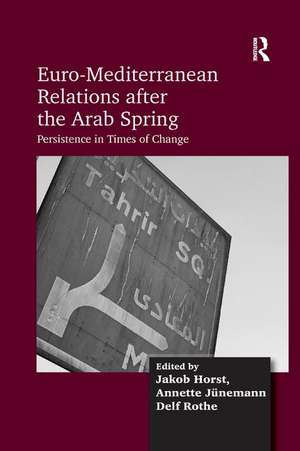Euro-Mediterranean Relations after the Arab Spring: Persistence in Times of Change
Autor Jakob Horst, Annette Jünemann, Delf Rotheen Limba Engleză Paperback – 27 oct 2017
Preț: 259.98 lei
Preț vechi: 311.41 lei
-17% Nou
Puncte Express: 390
Preț estimativ în valută:
49.75€ • 52.07$ • 41.41£
49.75€ • 52.07$ • 41.41£
Carte tipărită la comandă
Livrare economică 31 martie-14 aprilie
Preluare comenzi: 021 569.72.76
Specificații
ISBN-13: 9781138572577
ISBN-10: 1138572578
Pagini: 252
Dimensiuni: 156 x 234 x 23 mm
Greutate: 0.45 kg
Ediția:1
Editura: Taylor & Francis
Colecția Routledge
Locul publicării:Oxford, United Kingdom
ISBN-10: 1138572578
Pagini: 252
Dimensiuni: 156 x 234 x 23 mm
Greutate: 0.45 kg
Ediția:1
Editura: Taylor & Francis
Colecția Routledge
Locul publicării:Oxford, United Kingdom
Notă biografică
Jakob Horst is a PhD candidate at the Helmut-Schmidt-University, Hamburg, Germany working on International Relations, Mediterranean politics and the case of Algeria. Annette Jünemann is Professor of Political Science and International Relations at the Helmut-Schmidt-University, University of the German Armed Forces in Hamburg, Germany. Delf Rothe has recently finished his PhD on the securitisation of climate change and is a researcher and lecturer at the Helmut-Schmidt-University, Hamburg, Germany.
Recenzii
’Either/or explanations dominate many academic and public debates on the Middle East. This lack of nuanced analyses is problematic for it underlies many rather static debates on Arab countries before and after the Arab Awakening. Horst, Jünemann and Rothe break with this logic. By focusing on logics of action on the regional (Euro-Mediterranean), national and transnational levels they are able to detect the deeper dynamics of persistence and change at play in Arab politics, on both the structural and actor-related levels. This book is an invaluable must-read for everybody striving to move beyond either/or explanations when discussing persistence and change in Arab politics without getting lost in the transition currently underway.’ Stephan Stetter, Universität der Bundeswehr München, Germany ’What impresses above all is the common analytical perspective, honed over several years of research collaboration among the contributors. It gives this volume a coherence that existing studies of Euro-Mediterranean relations and the Arab Spring lack. Essential reading for students of Middle East and North African politics and anyone interested in European policy towards the South.’ Richard Gillespie, University of Liverpool, UK
Cuprins
Chapter 1 Logics of Action in the Euro-Mediterranean Political Space, JakobHorst, AnnetteJünemann, FlorianKühn, Eva-MariaMaggi, DelfRothe; Part I The EU’s Mediterranean Policy after the ‘Arab Spring’; Chapter 2 Change to Stay the Same, Eva-MariaMaggi; Chapter 3 Facing a Dilemma, AnnetteJünemann; Chapter 4 Learning to Cope, PeterSeeberg; Chapter 5 Free Trade, Development and Authoritarianism in a Rentier Economy, JakobHorst; Part II Persistence and Change in Selected Countries; Chapter 6 A Revolution in the Logics of Action? Renegotiating the Authoritarian Social Contract in Egypt, CiljaHarders; Chapter 7 Blocked Middle Classes as an Engine of Change in the Arab World?, RachidOuaissa; Chapter 8 Exploring the Logics of Moderate Islamists’ Political Actions in the Light of the ‘Arab Spring’ – The Cases of Jordan and Morocco, Kerstin FritzscheIvesa Lübben; Chapter 9 On the Logics of the Egyptian Transformation Process, IngridEl Masry; Part III Transnational Actors and their Logics of Action; Chapter 10 Welcome to the Desert, DelfRothe; Chapter 11 Mediterranean Players Par Excellence? Sketching Foreign-Educated Syrians’ Logics of Action, TinaZintl; Chapter 101 Conclusion;
Descriere
The ’Arab Spring’ triggered paradigmatic shifts but, despite these changes, much in the Euro-Mediterranean region remains the same. Utilising ’Logics of Action’, an innovative theoretical framework designed to capture the complexity of political interaction in one of the fastest changing regions in the world, this book discusses developments in the region before and after the Arab Spring that can be characterised by a continuation of the norm. Offering a completely new perspective on the events of the ’Arab Spring’ it identifies something that seems paradoxical at first sight; persistence in times of radical change.
